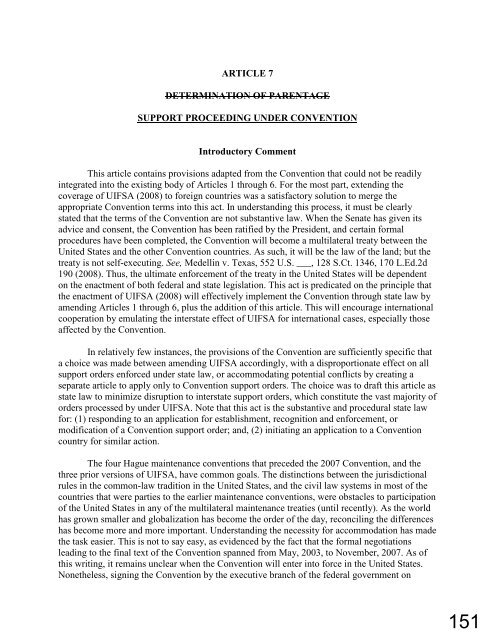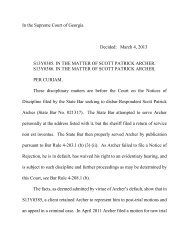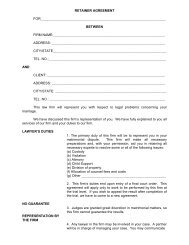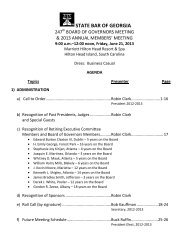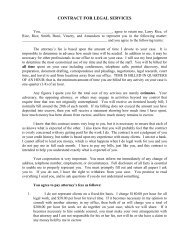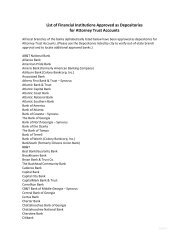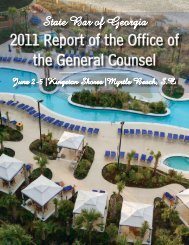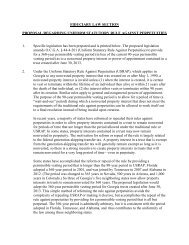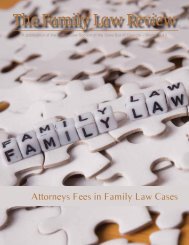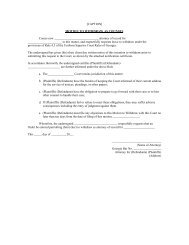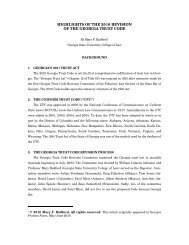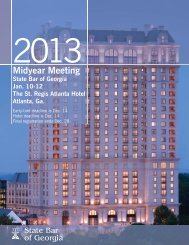2008 Amendments to the Uniform Interstate Family Support Act ...
2008 Amendments to the Uniform Interstate Family Support Act ...
2008 Amendments to the Uniform Interstate Family Support Act ...
You also want an ePaper? Increase the reach of your titles
YUMPU automatically turns print PDFs into web optimized ePapers that Google loves.
ARTICLE 7<br />
DETERMINATION OF PARENTAGE<br />
SUPPORT PROCEEDING UNDER CONVENTION<br />
Introduc<strong>to</strong>ry Comment<br />
This article contains provisions adapted from <strong>the</strong> Convention that could not be readily<br />
integrated in<strong>to</strong> <strong>the</strong> existing body of Articles 1 through 6. For <strong>the</strong> most part, extending <strong>the</strong><br />
coverage of UIFSA (<strong>2008</strong>) <strong>to</strong> foreign countries was a satisfac<strong>to</strong>ry solution <strong>to</strong> merge <strong>the</strong><br />
appropriate Convention terms in<strong>to</strong> this act. In understanding this process, it must be clearly<br />
stated that <strong>the</strong> terms of <strong>the</strong> Convention are not substantive law. When <strong>the</strong> Senate has given its<br />
advice and consent, <strong>the</strong> Convention has been ratified by <strong>the</strong> President, and certain formal<br />
procedures have been completed, <strong>the</strong> Convention will become a multilateral treaty between <strong>the</strong><br />
United States and <strong>the</strong> o<strong>the</strong>r Convention countries. As such, it will be <strong>the</strong> law of <strong>the</strong> land; but <strong>the</strong><br />
treaty is not self-executing. See, Medellin v. Texas, 552 U.S. ___, 128 S.Ct. 1346, 170 L.Ed.2d<br />
190 (<strong>2008</strong>). Thus, <strong>the</strong> ultimate enforcement of <strong>the</strong> treaty in <strong>the</strong> United States will be dependent<br />
on <strong>the</strong> enactment of both federal and state legislation. This act is predicated on <strong>the</strong> principle that<br />
<strong>the</strong> enactment of UIFSA (<strong>2008</strong>) will effectively implement <strong>the</strong> Convention through state law by<br />
amending Articles 1 through 6, plus <strong>the</strong> addition of this article. This will encourage international<br />
cooperation by emulating <strong>the</strong> interstate effect of UIFSA for international cases, especially those<br />
affected by <strong>the</strong> Convention.<br />
In relatively few instances, <strong>the</strong> provisions of <strong>the</strong> Convention are sufficiently specific that<br />
a choice was made between amending UIFSA accordingly, with a disproportionate effect on all<br />
support orders enforced under state law, or accommodating potential conflicts by creating a<br />
separate article <strong>to</strong> apply only <strong>to</strong> Convention support orders. The choice was <strong>to</strong> draft this article as<br />
state law <strong>to</strong> minimize disruption <strong>to</strong> interstate support orders, which constitute <strong>the</strong> vast majority of<br />
orders processed by under UIFSA. Note that this act is <strong>the</strong> substantive and procedural state law<br />
for: (1) responding <strong>to</strong> an application for establishment, recognition and enforcement, or<br />
modification of a Convention support order; and, (2) initiating an application <strong>to</strong> a Convention<br />
country for similar action.<br />
The four Hague maintenance conventions that preceded <strong>the</strong> 2007 Convention, and <strong>the</strong><br />
three prior versions of UIFSA, have common goals. The distinctions between <strong>the</strong> jurisdictional<br />
rules in <strong>the</strong> common-law tradition in <strong>the</strong> United States, and <strong>the</strong> civil law systems in most of <strong>the</strong><br />
countries that were parties <strong>to</strong> <strong>the</strong> earlier maintenance conventions, were obstacles <strong>to</strong> participation<br />
of <strong>the</strong> United States in any of <strong>the</strong> multilateral maintenance treaties (until recently). As <strong>the</strong> world<br />
has grown smaller and globalization has become <strong>the</strong> order of <strong>the</strong> day, reconciling <strong>the</strong> differences<br />
has become more and more important. Understanding <strong>the</strong> necessity for accommodation has made<br />
<strong>the</strong> task easier. This is not <strong>to</strong> say easy, as evidenced by <strong>the</strong> fact that <strong>the</strong> formal negotiations<br />
leading <strong>to</strong> <strong>the</strong> final text of <strong>the</strong> Convention spanned from May, 2003, <strong>to</strong> November, 2007. As of<br />
this writing, it remains unclear when <strong>the</strong> Convention will enter in<strong>to</strong> force in <strong>the</strong> United States.<br />
None<strong>the</strong>less, signing <strong>the</strong> Convention by <strong>the</strong> executive branch of <strong>the</strong> federal government on<br />
151


